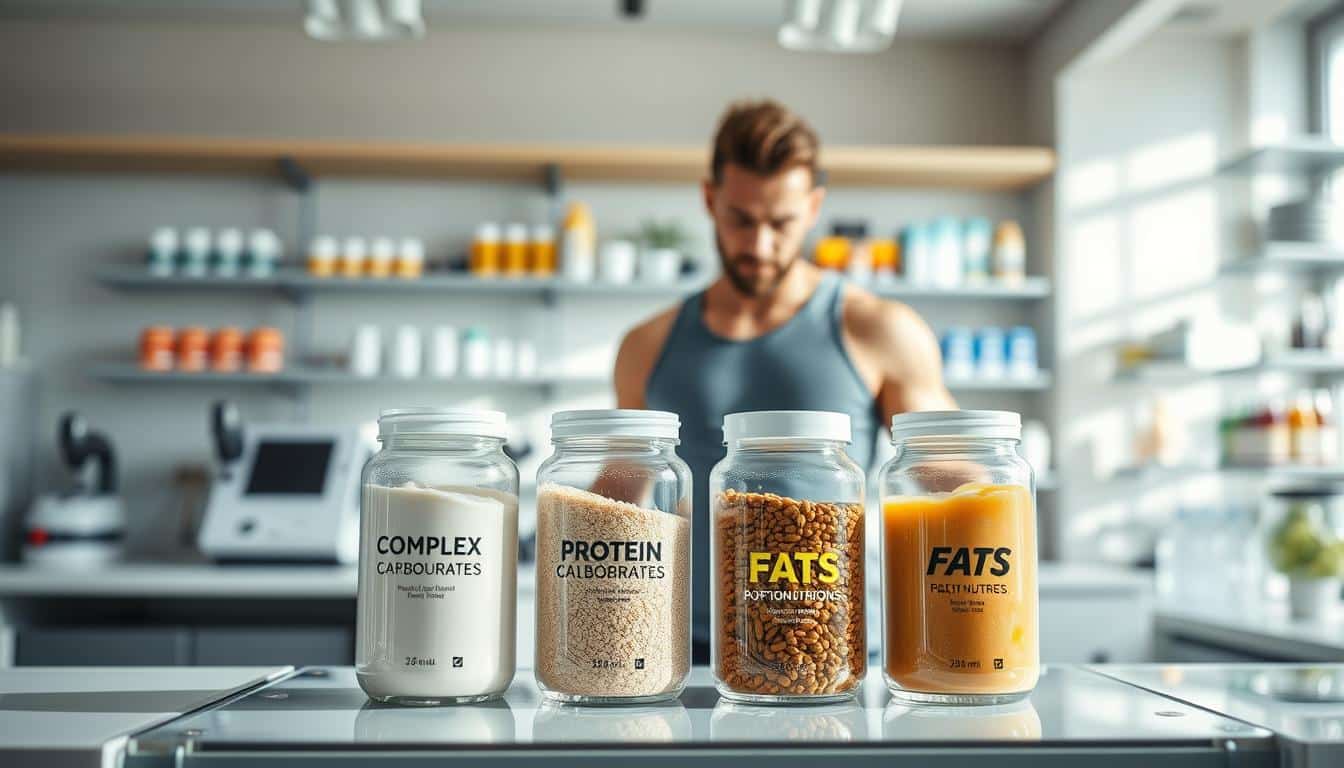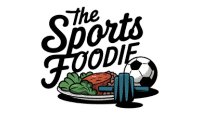Did you know that nearly 40% of athletes in various competitions are dehydrated? This startling fact highlights the critical role of proper diet and hydration in sports. Whether you’re a weekend warrior or a professional athlete, what you eat and drink can make or break your performance.
This guide is your go-to resource for understanding how to fuel your body effectively. From macronutrients like carbs, proteins, and fats to the importance of hydration and meal timing, we’ll break it all down. You’ll learn simple, actionable tips to boost your energy, recover faster, and stay at the top of your game.
Ready to take your performance to the next level? Let’s dive in and explore the science behind a winning diet and exercise routine.
Introduction to Nutrition and Athletic Performance
Fueling your body right can be the difference between winning and just participating. The food you eat plays a huge role in how well you perform during exercise. It’s not just about calories—it’s about choosing the right foods to power your body.
Think of your body like a car. Without the right fuel, it won’t run smoothly. Proper nutrition helps you maintain high energy levels, whether you’re practicing or competing. It also supports faster recovery and better overall health.

Fruits and vegetables are natural powerhouses of vitamins and nutrients. They provide essential support for your body’s needs during intense physical activity. Including them in your diet is a simple way to boost your athletic performance.
This article breaks down the basics of sports nutrition in a way that’s easy to understand. You’ll learn how to make smart food choices that enhance your training, recovery, and health. Let’s get started on the path to better performance!
The Role of Macronutrients in Sports
Macronutrients are the building blocks of a strong, energized body. They fuel your workouts, repair your muscle, and keep you going during intense training. Whether you’re lifting weights or running a marathon, the right balance of protein, carbohydrate, and fats can make all the difference.

Proteins for Muscle Repair
Protein is essential for repairing and building muscle after exercise. When you train, tiny tears occur in your muscle fibers. Protein helps rebuild them, making you stronger over time. Aim for 20–30 grams of protein after a workout to kickstart recovery.
Great sources include lean meats, eggs, and plant-based options like beans or tofu. Including protein in every meal ensures your body has what it needs to recover and grow.
Carbohydrates for Energy
Carbohydrates are your body’s primary source of energy. They fuel your muscles during high-intensity activities and help replenish glycogen stores afterward. For optimal performance, aim for 3–5 grams of carbohydrate per kilogram of body weight daily.
Before a workout, focus on complex carbs like whole grains or sweet potatoes. After training, quick-digesting carbs like fruits or rice can speed up recovery.
Here’s how to balance these macronutrients throughout your day:
- Breakfast: Oatmeal with berries and a scoop of protein powder.
- Lunch: Grilled chicken with quinoa and steamed veggies.
- Snack: Greek yogurt with honey and granola.
- Dinner: Salmon, brown rice, and a side salad.
By focusing on the right amount of protein and carbohydrate, you’ll enhance your performance, recover faster, and stay at the top of your game.
Micronutrients and Their Impact on the Athlete’s Body
Small but mighty, micronutrients are essential for peak physical performance. While macronutrients like carbs and proteins get most of the attention, vitamins and minerals are the unsung heroes that keep your body functioning at its best. They support everything from bone strength to energy production, making them a must-have in any athlete’s diet.
Key Vitamins and Minerals
Certain vitamins and minerals are particularly important for athletes. Vitamin D, for example, supports bone health and immune function. You can find it in fatty fish, eggs, and fortified foods. Vitamin B12 is another critical nutrient that helps with energy production and red blood cell formation. It’s abundant in animal products like meat, dairy, and eggs.
Minerals like calcium and iron are equally vital. Calcium strengthens bones, reducing the risk of injuries, while iron ensures oxygen is efficiently transported throughout your body. Leafy greens, dairy, and lean meats are excellent sources of these minerals.
Even small deficiencies in these micronutrients can impact your performance and recovery. For instance, low iron levels can lead to fatigue, while insufficient calcium may increase the risk of stress fractures. That’s why it’s crucial to include a variety of nutrient-rich foods in your daily meals.
Here are some simple ways to ensure you’re getting enough micronutrients:
- Add spinach or kale to your smoothies for a boost of vitamins and minerals.
- Snack on nuts and seeds, which are packed with magnesium and potassium.
- Include fortified cereals or plant-based milk in your diet for extra vitamin D and B12.
By prioritizing these essential micronutrients, you’ll support your body’s needs, enhance your performance, and maintain overall health. Remember, a well-rounded diet is the foundation of athletic success.
Hydration, Fluids, and Electrolytes in Exercise
Staying hydrated isn’t just about drinking water—it’s about maintaining the right fluid balance for peak performance. When you exercise, your body loses water and electrolytes through sweat. Replacing these is key to keeping your energy up and avoiding fatigue.
Why Hydration Matters
Hydration is essential for maintaining body functions during exercise. Water helps regulate temperature, transport nutrients, and remove waste. Even a small loss of fluid can impact your performance. For example, losing just 2% of your body weight in water can lead to fatigue and reduced endurance.
Fluid Replacement Concepts
To stay hydrated, you need to replace the fluid you lose. Start by drinking water before your workout. During exercise, sip water or a sports drink to maintain your level. Afterward, rehydrate with water or electrolyte-rich drinks. This simple routine helps you recover faster and perform better.
Signs of dehydration include thirst, dry mouth, and dark urine. To avoid these, drink regularly, even if you don’t feel thirsty. Pay attention to your sweat rate and adjust your intake based on the intensity of your workout and the weather.
Practical Tips for Hydration
- Drink 16–20 ounces of water 2–3 hours before exercise.
- Sip 7–10 ounces every 10–20 minutes during your workout.
- Rehydrate with 16–24 ounces of water for every pound lost after exercise.
By following these steps, you’ll maintain proper fluid balance and avoid issues like dehydration or hyponatremia. Simple hydration practices can make a big difference in your overall performance.
How Nutrition Affects Athletic Performance
Your body’s fuel source plays a critical role in how you perform during training and competition. Food isn’t just about satisfying hunger—it’s the primary source of energy and essential nutrients your body needs to excel. Whether you’re lifting weights or running a marathon, the right diet can make all the difference.
Studies show that proper fueling can significantly enhance endurance and strength. For example, athletes who consume adequate protein and carbohydrates experience faster recovery and improved muscle glycogen storage. This means better performance and less fatigue during intense workouts.
Every meal and snack you eat impacts your training and recovery. A balanced diet rich in whole foods provides the nutrients your body needs to build strength and endurance. Think of it as giving your body the tools it needs to perform at its best.
Here’s how you can optimize your nutrition for peak performance:
- Focus on whole, nutrient-dense foods like fruits, vegetables, lean proteins, and whole grains.
- Stay hydrated to maintain energy levels and support recovery.
- Time your meals and snacks to fuel your workouts and replenish afterward.
By prioritizing your nutrition, you’ll not only enhance your athletic performance but also support long-term health and well-being. Remember, every bite counts when it comes to fueling your success.
Optimizing Pre-Exercise Diet Strategies
Your pre-workout diet can set the tone for your entire training session. What you eat before exercise directly impacts your energy levels, endurance, and overall performance. By focusing on smart fueling strategies, you can maximize your effort and achieve better results.
Glycogen Loading Techniques
Glycogen is your body’s stored form of carbohydrate, and it’s the primary fuel source for high-intensity workouts. For long or intense sessions, loading up on glycogen can make a big difference. Start by increasing your carbohydrate intake 1–3 days before your workout. Focus on whole grains, fruits, and starchy vegetables to build up your reserves.
Here’s a simple plan for glycogen loading:
- Eat a balanced meal with 60–70% of calories from carbs.
- Include foods like pasta, rice, or sweet potatoes.
- Stay hydrated to help your body store glycogen efficiently.
Simple Pre-Workout Meals
Your pre-workout meal should be easy to digest and rich in carbs for quick energy. Aim to eat 1–3 hours before exercise to allow for proper digestion. Here are some quick and effective options:
- Oatmeal topped with banana and a drizzle of honey.
- Whole-grain toast with almond butter and sliced strawberries.
- Greek yogurt with granola and a handful of berries.
Timing is key. Eating too close to your workout can cause discomfort, while eating too early may leave you low on fuel. Experiment to find what works best for your body and schedule.
By optimizing your pre-exercise diet, you’ll boost your endurance, improve performance, and feel stronger throughout your workout. Start with these strategies and see the difference they make!
Nutrition During Exercise for Endurance and Strength
Keeping your energy steady during exercise is the secret to lasting longer and pushing harder. Whether you’re running a marathon or lifting weights, what you consume mid-activity can make a big difference. Let’s dive into how to fuel your body effectively during workouts.
Carbohydrates are your body’s go-to fuel source during exercise. They help maintain energy levels and prevent fatigue, especially during long sessions. For endurance activities, aim to consume 30–60 grams of carbs per hour. This keeps your glycogen stores topped up and your body performing at its best.
For strength training, a mix of carbs and protein can help sustain muscle power and recovery. Think of it as giving your body the tools it needs to keep going. Even small snacks or sips of a sports drink can make a noticeable difference.
Here are some practical tips to maintain your energy during workouts:
- Choose easy-to-digest foods like bananas, energy gels, or granola bars.
- Stay hydrated with water or electrolyte drinks to avoid dips in performance.
- For longer sessions, consider a mix of carbs and protein, like a peanut butter sandwich or a smoothie.
These simple strategies work for everyone, from casual gym-goers to professional athletes. By fueling smartly during exercise, you’ll boost your endurance, maintain strength, and feel stronger throughout your workout.
| Activity Type | Recommended Intake | Examples |
|---|---|---|
| Endurance | 30–60g carbs/hour | Energy gels, bananas, sports drinks |
| Strength | Carbs + protein | Peanut butter sandwich, smoothie, protein bar |
| Hydration | 7–10 oz every 20 minutes | Water, electrolyte drinks |
Post-Exercise Recovery Nutrition
After a tough workout, your body craves the right fuel to bounce back stronger. Recovery isn’t just about resting—it’s about giving your body what it needs to repair and recharge. Proper post-exercise nutrition can help you rebuild muscle, restore energy, and prepare for your next session.
Muscle Glycogen Restoration
During exercise, your body uses glycogen as its primary energy source. Replenishing these stores is key to feeling energized for your next workout. Studies show that consuming carbs within 30 minutes to two hours post-exercise can speed up glycogen restoration. High-glycemic foods like bananas, rice, or energy bars are great options.
Protein Intake for Recovery
Protein plays a crucial role in repairing and rebuilding muscle after exercise. Aim for 20–30 grams of protein post-workout to kickstart recovery. Foods like Greek yogurt, eggs, or a protein shake are quick and effective choices. Pairing protein with carbs can further enhance muscle repair and energy restoration.
Here’s a simple guide to post-exercise recovery:
- Eat a balanced meal within two hours of your workout.
- Include a mix of carbs and protein for optimal results.
- Stay hydrated to support overall recovery.
Consistency is key. By prioritizing post-exercise nutrition, you’ll improve your recovery, reduce soreness, and perform better in the long run. Start with these tips and see the difference they make!
Dietary Supplement Strategies for Athletes
Supplements can be a game-changer for athletes looking to optimize their diet and performance. They help fill nutritional gaps, boost energy, and support recovery. However, not all supplements are created equal. Choosing the right ones and using them safely is key to reaping their benefits.
Before adding supplements to your routine, it’s important to understand their role. They’re meant to complement a balanced diet, not replace it. Think of them as a tool to enhance your training, not a shortcut to success.
Safe Supplement Options
Some supplements are backed by research and can safely support your goals. For example, nitrate found in beetroot juice can improve endurance, while beta-alanine helps reduce fatigue during high-intensity workouts. Vitamin D is another essential nutrient that supports bone health and immune function.
When choosing supplements, always look for third-party testing. This ensures the product meets quality and safety standards. Brands with certifications like NSF or Informed-Sport are reliable choices.
Understanding the Risks
Not all supplements are safe or effective. Unregulated products may contain harmful ingredients or misleading claims. For example, some weight-loss supplements have been linked to serious health risks. Always research the product and consult a healthcare professional before starting any new supplement.
Another risk is over-reliance on supplements. They should never replace whole foods, which provide a wide range of nutrients your body needs. Balance is key to avoiding unintended health issues.
Recommendations for Athletes
Here’s a simple guide to incorporating supplements into your diet strategy:
- Focus on whole foods first, and use supplements to fill specific gaps.
- Choose products with third-party testing to ensure safety and quality.
- Consult a healthcare professional for personalized advice.
By making informed choices, you can safely enhance your performance and avoid potential risks. Supplements are a powerful tool when used correctly, but they’re just one piece of the puzzle.
| Supplement | Benefits | Safety Tips |
|---|---|---|
| Nitrate | Improves endurance | Choose beetroot-based products |
| Beta-Alanine | Reduces fatigue | Start with small doses |
| Vitamin D | Supports bone health | Check blood levels before use |
Practical Meal Timing and Frequency
When you eat is just as important as what you eat for peak performance. Proper meal timing ensures your body has the fuel it needs to power through training and recover effectively. By scheduling your meals strategically, you can maintain steady energy levels and avoid fatigue throughout the day.
Scheduling Meals Around Training
Planning your meals around your workout schedule is key to maximizing results. Eating a balanced meal 2–3 hours before training gives your body time to digest and convert food into energy. For early morning sessions, a light snack 30–60 minutes beforehand can provide a quick boost.
After exercise, refuel within an hour to replenish glycogen stores and support muscle recovery. A mix of carbs and protein, like a smoothie or a turkey sandwich, works wonders. Consistency in meal timing helps your body adapt and perform better over time.
Here’s a simple guide to meal timing for athletes:
- Eat a balanced meal 2–3 hours before training.
- Have a light snack 30–60 minutes before early morning workouts.
- Refuel within an hour post-exercise with carbs and protein.
- Space meals every 3–4 hours to maintain energy throughout the day.
| Time of Day | Meal Type | Example |
|---|---|---|
| Morning | Pre-Workout Snack | Banana with almond butter |
| Midday | Post-Workout Meal | Grilled chicken with quinoa |
| Evening | Recovery Dinner | Salmon, sweet potatoes, and greens |
By sticking to a consistent meal schedule, you’ll optimize your energy, enhance recovery, and perform at your best. Small adjustments in timing can lead to big improvements in your results.
Customizing Diets for Different Sports
Every sport has unique demands, and your diet should match them perfectly. Whether you’re running a marathon or lifting weights, your body needs specific fuel to perform at its best. By tailoring your meals to your activity, you can boost energy, recover faster, and achieve your goals.
Endurance and power sports require different approaches to sport nutrition. For example, a marathon runner focuses on carbs for sustained energy, while a weightlifter prioritizes protein for muscle repair. Understanding these differences can help you optimize your diet for your sport.
Diet Adjustments for Endurance
Endurance athletes, like runners or cyclists, need plenty of carbs to fuel long training sessions. Aim for 30–60 grams of carbs per hour during activities lasting over 90 minutes. This keeps your energy steady and prevents fatigue.
Before an event, eat a carb-rich meal 2–3 hours in advance. Follow it with a light snack, like a banana or energy bar, about an hour before starting. This ensures your body has the fuel it needs to go the distance.
Diet Adjustments for Power
Power athletes, such as weightlifters or sprinters, focus on protein and quick energy. Protein helps repair and build muscle after intense training. Aim for 20–30 grams of protein post-workout to kickstart recovery.
Before a competition, eat a balanced meal with both protein and carbs 3 hours in advance. This provides sustained energy and supports muscle power. A turkey sandwich or a smoothie with Greek yogurt are great options.
Here’s how to customize your diet based on your sport:
- Endurance: Focus on carbs for long-lasting energy. Include foods like pasta, rice, and fruits.
- Power: Prioritize protein for muscle repair. Choose lean meats, eggs, and plant-based options like tofu.
- Timing: Eat a balanced meal 2–3 hours before training and refuel within an hour after.
By adjusting your diet to your sport, you’ll enhance performance, recover faster, and feel stronger. Small changes can lead to big results!
Common Nutritional Deficiencies in Athletes
Even the most dedicated athletes can fall short on essential nutrients. A well-rounded diet is crucial, but many active individuals still miss key vitamins and minerals. These gaps can slow down progress, increase injury risk, and reduce the benefits of training.
One common deficiency is iron, especially for endurance athletes. Low iron levels can lead to fatigue, weakness, and shortness of breath. This happens because iron is essential for oxygen transport and energy production.
Another frequent issue is low vitamin D. This nutrient supports bone health and muscle function. Athletes with low levels may experience bone pain, muscle weakness, or even stress fractures. Indoor training and limited sun exposure often contribute to low vitamin D.
Calcium and magnesium are also critical. Calcium strengthens bones, while magnesium helps with muscle function and recovery. Deficiencies in these minerals can lead to cramps, brittle bones, or abnormal heart rhythms.
Here’s how to identify and address these gaps:
- Get regular blood tests to check for deficiencies like iron, vitamin D, and calcium.
- Include a variety of nutrient-rich foods in your diet, such as leafy greens, lean meats, and fortified products.
- Consider supplements if needed, but consult a healthcare professional first.
By staying proactive, you can avoid these pitfalls and keep your health and performance on track. Small changes in your diet can make a big difference!
Guidance from Sports Nutrition Experts
Getting the right advice can transform your approach to fueling your body. While general tips are helpful, personalized guidance from a dietitian can take your performance to the next level. Experts like Olivia Morgan emphasize the importance of tailored plans that fit your unique needs and goals.
Consulting a registered dietitian simplifies the process of planning meals. They can help you navigate complex topics like nutrient timing, supplement use, and meal prep. This ensures you’re not just eating well but optimizing every bite for your training and recovery.
Here’s how working with a professional can benefit you:
- They create customized meal plans that align with your activity level and goals.
- They provide insights into the best foods for energy, recovery, and overall health.
- They help you avoid common pitfalls like over-reliance on supplements or imbalanced diets.
Finding the right dietitian is easier than you think. Start by looking for certified professionals with experience in sports nutrition. Many offer virtual consultations, making it convenient to get expert advice from anywhere.
Personalized tips are often more effective than generic advice. A professional can identify gaps in your diet and suggest practical changes. This not only improves your performance but also supports long-term health and well-being.
By investing in expert guidance, you’ll gain confidence in your nutrition choices and see real results. It’s a small step that can lead to big improvements in your training and overall lifestyle.
Simple Tips for Daily Sports Nutrition
Small changes in your routine can lead to big results. Whether you’re training for a marathon or hitting the gym, your daily food choices matter. Start with these easy tips to fuel your body and stay on track.
Plan your meals ahead of time. This saves you from grabbing unhealthy options when you’re busy. Prepare balanced plates with lean proteins, whole grains, and plenty of veggies. This ensures you’re getting the nutrients you need every day.
Don’t skip snacks. Healthy snacks keep your energy steady between meals. Try a handful of nuts, a piece of fruit, or yogurt with granola. These quick bites are perfect for busy schedules.
Add variety to your diet. Eating different foods ensures you’re covering all your nutritional bases. Mix up your proteins, carbs, and fats to keep things interesting and nutritious.
Hydration is key. Drink water throughout the day, especially before and after workouts. Staying hydrated supports your energy levels and recovery.
By making these small changes, you’ll see big improvements in your performance. Start today and feel the difference!
Using Nutrition to Enhance Training and Recovery
What you eat and when you eat can transform your workout results. By blending your nutrition plan with your training schedule, you can boost energy, improve recovery, and achieve better results. It’s not just about eating right—it’s about timing and tracking to maximize your efforts.
Integrating Nutrition Plans with Workouts
Your meals should align with your training intensity and goals. For example, eat a balanced meal 2–3 hours before exercise to fuel your session. Include carbs for energy and protein for muscle support. After your workout, refuel within an hour to replenish glycogen and kickstart recovery.
Here’s a simple approach to meal planning:
- Pre-Workout: Oatmeal with fruit and a scoop of protein powder.
- Post-Workout: Grilled chicken with sweet potatoes and veggies.
- Snacks: Greek yogurt with granola or a handful of nuts.
By syncing your meals with your training, you’ll maintain steady energy and recover faster.
Tracking Nutritional Progress
Monitoring your nutrition helps you identify what works and what doesn’t. Keep a food journal or use an app to log your meals, snacks, and hydration. Track how you feel during and after exercise to spot patterns.
For example, if you feel sluggish during workouts, you might need more carbs. If recovery takes longer, increase your protein intake. Adjust your plan based on your results to keep improving.
Here are some tips for effective tracking:
- Note your energy level during workouts.
- Record how quickly you recover after exercise.
- Adjust your meals based on your performance and recovery.
By staying consistent and making small tweaks, you’ll see steady progress in your training and recovery.
Conclusion
Your journey to peak performance starts with the right fuel. From macronutrients to hydration and recovery, every bite counts. A balanced diet not only supports your health but also enhances your results in every competition.
Apply the simple, step-by-step advice in your daily training. Focus on whole foods, stay hydrated, and time your meals to match your workouts. These small changes can lead to big improvements in your performance and recovery.
Proper nutrition builds a foundation for both immediate results and long-term success. Whether you’re a casual gym-goer or a pro athlete, the right diet can help you achieve your goals.
Take charge of your nutrition today. With expert guidance and consistent effort, you’ll feel stronger, recover faster, and perform better in every competition. Your best performance is just a meal away!


